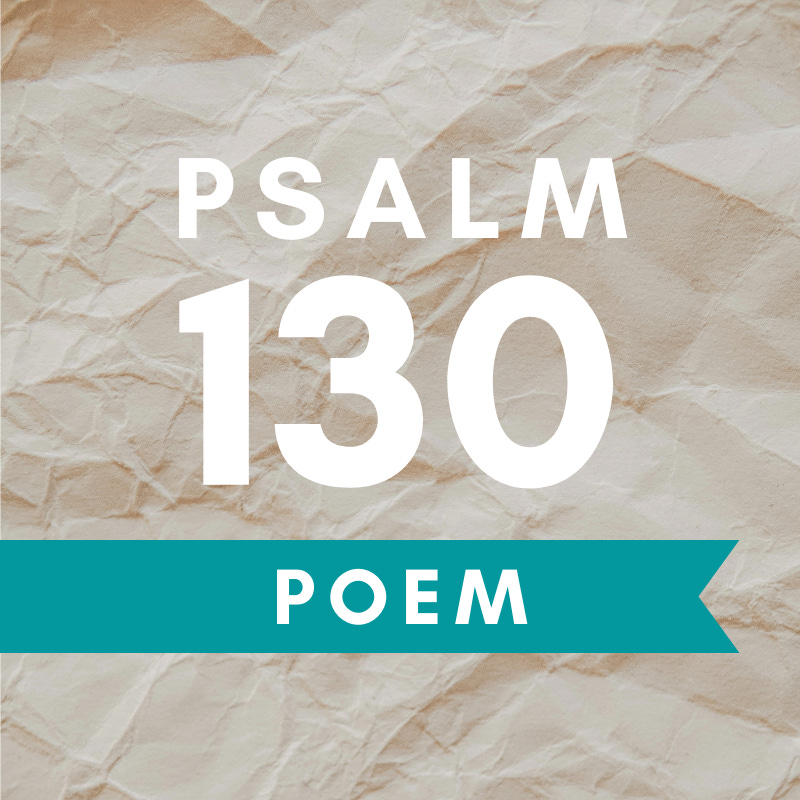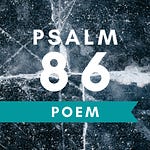Psalm 130 Poem—A Treasure You Must Destroy To See
That first couple discovered
Their bodies were made for gladness.
Then in the blush of shame
They donned knowledge
Like clothing hastily sewn.
But you say:
Innocence is remembering:
We had been happy naked.
You will not outlive your past
But your love is safe with me.
We were a paper box
You fashioned from earth
And put your lips to.
Our first breath was your exhalation.
It billowed the sail of these bodies
And sent us across the sea.
Still, I become afraid
That ahead is only the darkling
And little else.
But you say:
Your chest is filled
with the breath that made it
And a treasure
You must destroy to see.
She prays while I
Pace across the fields in crisis,
Or, when it rains, the hayloft.
At night, I am awake and uncertain
As everyone who rises early to pray
And is filled with fear
And is still small.
I wait and watch for the morning.
But you say:
Until you find your quiet,
How can you hear
Consolations in the stillness?
How can you expect
To lay down your arms
Until you lose the battle?
How can you expect
Your love to be born—
Healed and whole—
Until it is carried to term?
If you hear a voice that is not your own
In the pre-dawn darkness,
Attend to it. I hear you.
Notes on the Poem
This is a poem about marriage, another internal mini-theme in the Darkling Psalter.
We were a paper box
You fashioned from earth
And put your lips to.
The “paper box” in the poem is one of those folding things you blow into and it expands. The original poem was written on the inside of one of those given as a gift to my wife. Those lines are also a reference to Genesis 2 when God creates Adam from the clay and breathes life into his nostrils.
The bit about “a treasure you must destroy to see” is a reference to the fact that she had to take the box apart to read what was written inside. It is also a nod to the fact that it is often in conflict that we grow the most. In Christian theology as in life, there is a curious connection between “mortification” (dying to oneself) and “sanctification” (the process of becoming more like Christ). In my experience, this most often comes through the keeping of one’s covenants and fidelities over time. Whether in marriage, or living in a community, or loving one’s neighbors, or toiling at a long work, God uses the things we labor at building to build and shape us. The catch is that sometimes when that life-giving work is playing out, it feels like dying.
There is a treasure inside, but something has to be destroyed in order for it to be revealed.
She prays while I
Pace across the fields in crisis,
Or, when it rains, the hayloft.
These lines are a reference to Francis and Edith Schaeffer, the founders of L’Abri Fellowship, a community that has had a great impact on me and where I used to work and live. In the 1950’s, just before starting L’Abri, Francis Schaeffer had a spiritual crisis in which he began to doubt whether Christianity was the truth or not. He found he had to go all the way back and reexamine everything. He talks about it in the preface to True Spirituality.
“We were living in Champery [Switzerland] at the time, and I told Edith that for the sake of honesty I had to go all the way back to my agnosticism and think through the whole matter. I’m sure that this was a difficult time for her, and I’m sure that she prayed much for me in those days. I walked in the mountains when it was clear, and when it was rainy I walked backward and forward in the hayloft of the old chalet in which we lived. I walked, prayed, and thought through what the Scriptures taught, as well as reviewing my own reasons for becoming a Christian.”
I have often thought of Edith down there praying for her husband’s faith as the rain poured down outside and she listened to his footsteps pacing back and forth across the floor upstairs.
That image, and the experience of the Schaeffer’s, fit perfectly inside what this poem is trying to say.
Psalms: 1, 2, 3, 4, 5, 6, 7, 8, 9, 10, 11, 12, 13, 14, 15, 16, 18, 19, 20, 21, 22, 23, 24, 25, 26, 27, 28, 29, 31, 32, 34, 35, 38, 39, 40, 42, 43, 46, 50, 51, 53, 54, 62, 63, 65, 66, 73, 74, 75, 84, 86, 88, 90, 91, 100, 107, 110, 114, 117, 118, 119, 120, 121, 122, 123, 124, 125, 126, 127, 128, 129, 130, 131, 132, 133, 134, 137, 139, 140, 142, 147, 148.
Request the Darkling Psalter in Print
If you would like to move this project one step closer to publication, sign up on this form to request the Darkling Psalter in print.















Share this post